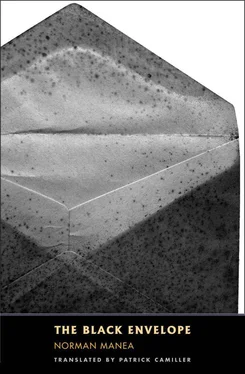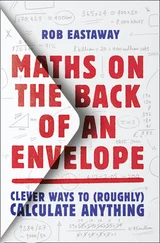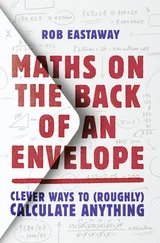“Goo-ood, it’s all gone now …” as he screwed the top on the bottle.
He looked again at the bottle, dreamily. A thimbleful was all that remained at the bottom.
“What can I do? You know I don’t drink: I wouldn’t touch the stuff even if you cut me into little pieces. Only when I come here to Uncle, to the resuscitation room. Very rarely, you must admit. Once in a hundred years, at the end of the century. Now in the year 1000, at the end of the century and of the world. The end of the world— that is, the beginning; an iron world because of its severity, a leaden world because of its wickedness. A dark world lacking in authors, dulcissime frater , that’s what it is.”
He searched one of the pockets of his velvet trousers, took out a ball of thin, shiny paper, and held it out to Marga. But Marga did not notice, or did not want to notice, as he went on cleaning his glasses. Tolea solemnly placed the piece of paper on the table, next to the glass.
“What’s that smell here? What the hell is it? Maybe that old woman had made moussaka again.”
“There isn’t any smell. You’re imagining it.”
“What do you mean! It’s enough to knock you out. The hag must have put some tomato juice in it as well. I told her last time she should never do it again, never put tomato juice in moussaka!”
“You’re raving. There isn’t any moussaka. And Jeny isn’t around: she had to be admitted to the hospital. When spring comes there’s no avoiding it. She always gets like that in spring. I had her admitted yesterday.”
“Aha, so that’s it. You’ve had her locked up. Goo-ood. But why hasn’t Bazil shown his face?”
“Bazil’s having a bath. His head ached and he was beginning to stutter. It’s not a good sign. You know what his crises are like; they come back sometimes. The bath will help pick him up.”
“He’s actually in the bath? In Goody-Goody’s bathtub? No, I must be hearing things. Tell me the truth: is he really having a bath in the great doctor’s tub? Are you an apostolic missionary, an ambassador of the Red Cross, or the Green Crescent, or the United Organization called the Losers’ Charity? Or are you a rabbi, Dr. Marga, a rabbi’s son? Didn’t you say once that you psychiatrists are like rabbis? Or maybe you’re a Buddhist, Uncle Marga? Are you Tao; yes, you must be Tao, or Zen or yoga — what are you? I bet you’re a mason — is that it? Yes, James Mason, the killer disguised as the Holy Woman among lepers.”
“You don’t know Vasile. He’s the cleanest man on earth. He cleans the bath centimeter by centimeter — and then he has a go with alcohol as well.”
“Of course, and with sulphamide, too. Come on, old man, tell me: they’ve finally taken away your right to practice, haven’t they? They finally caught on, they must have — the swindle stank to high heaven! Philanthropic, sure, like all swindlers, I know. But they’ve taken away your thingamajig, admit it, and that contraption for listening to hiccups and those dissertations on hocus-pocus hypnosis and hara-kiri; they’ve liberated you from them, haven’t they? Look, I’ve been here for an hour. The phone hasn’t rung once. And I’ve been here an hour, more than an hour. The phone’s dead, sir, dead. There’s no longer a line outside the confessional, Uncle; the patients have gone; your conjuring trick has been taken away. Come on, be brave for once and admit it.”
“But it does ring. Listen, it’s ringing now: they haven’t found me out yet.”
The telephone really was ringing, and it was not hard to predict the conversation.
“Yes, old pal, I’ve seen the results of the tests: don’t worry, it’s going to be all right.” Or: “Of course, madam, those are side effects of the treatment; everything’s quite normal, you’ll see.” Or: “Why are you crying, Comrade Engineer? You’re perfectly sane. Come and talk it over: things can be done — of course, they always can.” And so on: candies, sleeping pills, fumigation, just be patient.
“Of course, madam. No, it’s no bother. Yes, I spoke to him again yesterday and asked him. Come for a check-up after a month — after a month. It’s an irritation, that’s all, just some allergic reaction. Take th tablets, of course. Yes, you can ring in the evening — any time in the evening.”
Bearded Marga swung his red smock and turned to face tipsy Tolea. But the telephone rang again.
“Speaking. Don’t be silly: I was expecting you to ring. Alternately — as I wrote on the prescription; alternately. You have my assurance, Comrade Colonel, my signature. Absolutely certain. We’ll have good news, very good.”
Before returning to his seat on the stool, the plump doctor again wiped his glasses with the skirt of his smock. His large clear eyes could now be seen: the blue real one and the blue artificial one— you couldn’t tell them apart. Then they could no longer be seen again, as he put the smoky glasses back on.
“You’ll stay for dinner, Tolea. We’ll have another chat.”
“If you remember who was invited then.”
“There you go again. Nearly forty years have passed since then, Tolea! Even if I was completely normal, I’d still have the right to forget. But I’m not completely normal. This job has got to me, too, you know.”
“Quit the whining: it bores me stiff. Just one at least — just one witness, that’s all. I’m not doing any harm: it’s just a hobby — infantile behavior, as you put it. But I do want to see them again. Particularly one of them, you know which one. Just to see him. Otherwise I’ll get bored and die. I can’t take the lyrical boredom of spring. I’m telling you, I’ll die otherwise.”
Mr. Anatol Dominic, also called Tolea, leaned toward the table and picked up the ball of paper. Then he stepped forward, as if he wanted to hand the message to the doctor — to hand him the letter. The doctor did not notice the movement: it must have been in the line of his glass eye. Dominic opened up the paper, as if to read what was on it. A letter, no less, he said, trying to summarize its contents.
The doctor exhaled as he registered the news.
“Goo-ood. What can I say? In the midst of a world crisis, you’re the only one whose shares are rising. Maybe Señor Claudiu has been pining for his kid brother. Money expresses affections, as you know. He must have been thinking of you. He’s a delicate, sensitive soul — the money proves that, I can tell you as a professional.”
“I still don’t believe it, and in fact I won’t until I see the money. I know my dear old brother,” muttered Tolea. He took from his other pocket a creased envelope that had been stamped many times. He put it on the table next to the bottle, but in doing so he knocked the ball of paper down beside the stool. Mr. Dominic looked absentmindedly in the direction of the tall, narrow, castle-like windows, the book-lined walls, the huge lampstand in the center of the hall, the glass squares of the roof, the checkerboard squares of the floor.
Mr. Marga was standing silently at the window. Tolea did not see him, or saw him no longer. Nor did he see Bazil. The voiceless doctor was puffing and blowing; Mr. Dominic did not see him. Bazil had revived, a statue in front of the door — Mr. Tolea did not see him. Deathly silence, no one saying a word. There must have been some sad news in the letter, some memory or sorrow, who knows?
They are no longer looking at each other, as if they are not there. There is no way Tolea can have noticed when his host makes a brief sign. The valet disappears: he has never been there: when could he have been there, since he is no longer visible? Tolea is far gone, as if he has suddenly lost his wits. Eyes staring, mouth wide open, he looks as if he might be unconscious. But he shudders when Marga slowly lifts him up, holding him under the arms. He looks at the doctor attentively, vacantly. Marga grips him behind his shoulders and gently pushes him toward the end of the hall. There are two steps at the end of the hall — a kind of podium, like a stage beneath the spotlight in the ceiling. There, at the end, dinner is being served. They are together, on the two tall chairs on either side of the long table, at the far end of the hall.
Читать дальше












